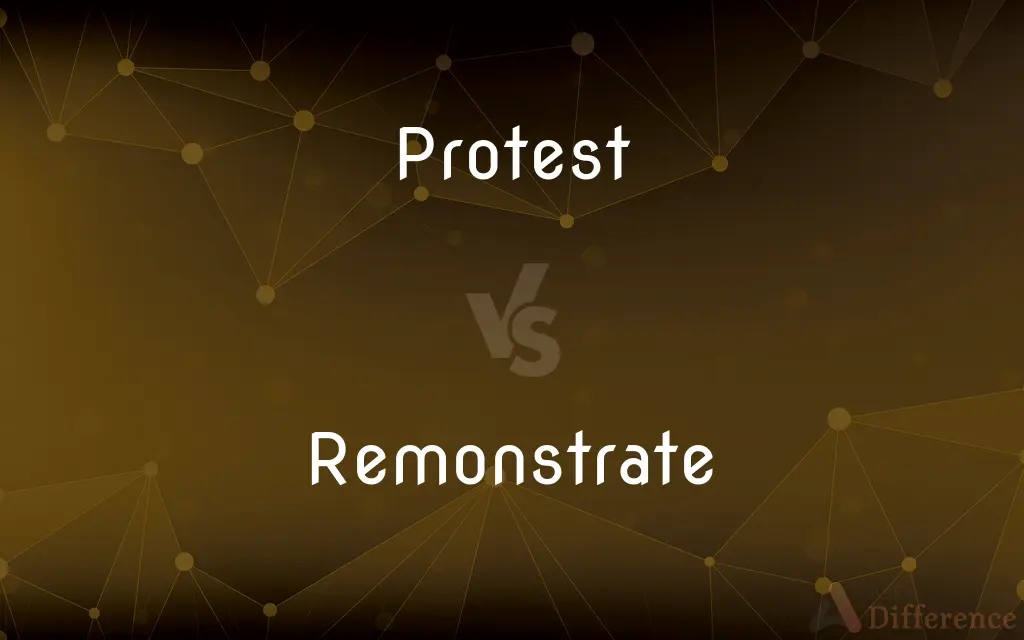Protest vs. Remonstrate — What's the Difference?
Edited by Tayyaba Rehman — By Maham Liaqat — Updated on April 30, 2024
Protest involves expressing objection or disapproval publicly, often through actions; remonstrate means to protest or complain about something in a forceful manner.

Difference Between Protest and Remonstrate
Table of Contents
ADVERTISEMENT
Key Differences
Protests are typically public demonstrations or actions that express opposition to certain policies or decisions, aiming to bring about change or raise awareness. On the other hand, to remonstrate is to make a forcefully reproachful protest, often in a private setting, directly to the person or entity responsible for the grievance.
Protests can be organized by various groups and can vary in form from marches to sit-ins, emphasizing collective action and visibility. Whereas remonstration is more about verbal expression of discontent and may not necessarily involve mass participation or public display.
Protests are generally aimed at attracting public and media attention to influence broader societal or political change. Conversely, remonstration is often more focused on direct dialogue or confrontation, aiming to persuade or rebuke an individual or small group.
Protests can be ongoing and involve long-term campaigns, sometimes without immediate resolution. On the other hand, remonstration typically involves a direct, immediate expression of grievance in response to a specific issue, aiming for a quicker resolution or response.
Protests often involve signs, chants, and a physical presence as forms of expression. In contrast, remonstration relies heavily on articulate argumentation and reasoning, focusing on verbal communication.
ADVERTISEMENT
Comparison Chart
Definition
Public demonstration of disapproval
Forceful verbal objection or complaint
Mode of expression
Collective, often non-verbal
Primarily verbal
Visibility
High, aimed at public awareness
Lower, often private or semi-private
Focus
Broad societal or political issues
Specific grievances or decisions
Duration and response
May be prolonged; seeks broad change
Immediate; seeks direct resolution
Compare with Definitions
Protest
Public demonstration against something.
The streets filled with people in protest against the new law.
Remonstrate
Voice dissent against a decision or action.
They remonstrated with the officials about the lack of transparency.
Protest
Organized refusal to comply.
The workers went on strike in protest of the pay cuts.
Remonstrate
Argue in protest or opposition.
He chose to remonstrate rather than silently accept the policy.
Protest
Formal declaration of objection.
She filed a protest with the city council.
Remonstrate
Make a forcefully reproachful protest.
She remonstrated against the unfair treatment she received.
Protest
Collective outcry or opposition.
There was a nationwide protest following the court decision.
Remonstrate
Complain or object strongly.
The community remonstrated the proposed changes in the park.
Protest
Act of expressing dissent.
His silence was a form of protest.
Remonstrate
Express earnest opposition through words.
He remonstrated with his colleague over the ethical issue.
Protest
A protest (also called a demonstration, remonstration or remonstrance) is a public expression of objection, disapproval or dissent towards an idea or action, typically a political one. Protests can take many different forms, from individual statements to mass demonstrations.
Remonstrate
To say or plead in protest, objection, or reproof.
Protest
To express a strong objection to (something)
Protest a job assignment.
Remonstrate
To reason or plead in protest; present an objection.
Protest
To participate in a public demonstration in opposition to (something)
Thousands protested the election fraud.
Remonstrate
(intransitive) To object with in critical fashion; to express disapproval (with, against).
Protest
To promise or affirm earnestly, as after being doubted
"He continually protested his profound respect" (Frank Norris).
Remonstrate
Specifically, to lodge an official objection (especially by means of a remonstrance) with a monarch or other ruling body.
Protest
(Law) To declare an objection and reservation of rights of (a claim being made) while taking an action that would otherwise imply consent or agreement.
Remonstrate
To state or plead as an objection, formal protest, or expression of disapproval.
Protest
(Archaic) To proclaim or make known
"unrough youths that even now / Protest their first of manhood" (Shakespeare).
Remonstrate
To point out; to show clearly; to make plain or manifest; hence, to prove; to demonstrate.
Protest
To express a strong objection.
Remonstrate
To point out; to show clearly; to make plain or manifest; hence, to prove; to demonstrate.
I will remonstrate to you the third door.
Protest
To participate in a public demonstration in opposition to something.
Remonstrate
To present and urge reasons in opposition to an act, measure, or any course of proceedings; to expostulate; as, to remonstrate with a person regarding his habits; to remonstrate against proposed taxation.
It is proper business of a divine to state cases of conscience, and to remonstrate against any growing corruptions in practice, and especially in principles.
Protest
To make an earnest avowal or affirmation.
Remonstrate
Argue in protest or opposition
Protest
A formal declaration of disapproval or objection issued by a concerned person, group, or organization.
Remonstrate
Present and urge reasons in opposition
Protest
A public demonstration or organized effort to show disapproval about something, especially a governmental policy or practice.
Remonstrate
Censure severely or angrily;
The mother scolded the child for entering a stranger's car
The deputy ragged the Prime Minister
The customer dressed down the waiter for bringing cold soup
Protest
(Law) A declaration of objection and reservation of rights, made when action would otherwise imply consent or agreement
Payment under protest.
Protest
(intransitive) To make a strong objection.
How dare you, I protest!
The public took to the streets to protest over the planned change to the law.
Protest
(transitive) To affirm (something).
I protest my innocence.
I do protest and declare
Protest
To object to.
They protested the demolition of the school.
Protest
To call as a witness in affirming or denying, or to prove an affirmation; to appeal to.
Protest
To make a solemn written declaration, in due form, on behalf of the holder, against all parties liable for any loss or damage to be sustained by non-acceptance or non-payment of (a bill or note). This should be made by a notary public, whose seal it is the usual practice to affix.
Protest
To publish; to make known.
Protest
A formal objection, especially one by a group.
They lodged a protest with the authorities.
Protest
A collective gesture of disapproval; a demonstration.
We held a protest in front of City Hall.
Protest
The noting by a notary public of an unpaid or unaccepted bill.
Protest
A written declaration, usually by the master of a ship, stating the circumstances attending loss or damage of ship or cargo, etc.
Protest
To affirm in a public or formal manner; to bear witness; to declare solemnly; to avow.
He protest that his measures are pacific.
The lady doth protest too much, methinks.
Protest
To make a solemn declaration (often a written one) expressive of opposition; - with against; as, he protest against your votes.
The conscience has power . . . to protest againts the exorbitancies of the passions.
Protest
To make a solemn declaration or affirmation of; to proclaim; to display; as, to protest one's loyalty.
I will protest your cowardice.
Protest
To call as a witness in affirming or denying, or to prove an affirmation; to appeal to.
Fiercely [they] opposedMy journey strange, with clamorous uproarProtesting fate supreme.
Protest
A solemn declaration of opinion, commonly a formal objection against some act; especially, a formal and solemn declaration, in writing, of dissent from the proceedings of a legislative body; as, the protest of lords in Parliament.
Protest
A solemn declaration in writing, in due form, made by a notary public, usually under his notarial seal, on behalf of the holder of a bill or note, protesting against all parties liable for any loss or damage by the nonacceptance or nonpayment of the bill, or by the nonpayment of the note, as the case may be.
Protest
A formal and solemn declaration of objection;
They finished the game under protest to the league president
The senator rose to register his protest
The many protestations did not stay the execution
Protest
The act of protesting; a public (often organized) manifestation of dissent
Protest
The act of making a strong public expression of disagreement and disapproval;
He shouted his protests at the umpire
A shower of protest was heard from the rear of the hall
Protest
Utter words of protest
Protest
Express opposition through action or words;
Dissent to the laws of the country
Protest
Affirm or avow formally or solemnly;
The suspect protested his innocence
Common Curiosities
What is a protest?
A protest is a public demonstration of disapproval or opposition to specific policies or actions.
What is the primary focus of a protest compared to remonstrating?
Protests focus on broader societal or political issues, while remonstration targets specific grievances or decisions.
What does it mean to remonstrate?
To remonstrate means to make a forcefully reproachful or critical protest, often verbally.
Can a protest be considered a form of remonstration?
While both involve expressions of dissent, protests are broader and more public, and remonstration is specifically a forceful verbal objection.
How does a protest differ from remonstrating in terms of visibility?
Protests are highly visible and public, whereas remonstration tends to be more private or semi-private.
How does the duration of impact differ between protests and remonstrating?
Protests can be ongoing and seek long-term changes, whereas remonstrating aims for quicker resolutions to specific issues.
What motivates someone to remonstrate?
Motivation often comes from a need to express immediate and direct opposition to an action or decision perceived as unfair or wrong.
Are protests always legal?
Legality depends on local laws; some regions require permits for public protests.
What are common forms of protests?
Common forms include marches, sit-ins, strikes, and demonstrations.
What are typical scenarios for remonstration?
Typical scenarios include arguing against a decision in a meeting, complaining about service, or opposing a policy directly to those responsible.
Why do people protest?
People protest to express dissent, seek changes, raise awareness, and influence public opinion or policy.
Share Your Discovery

Previous Comparison
Average vs. Overall
Next Comparison
Propfan vs. TurbofanAuthor Spotlight
Written by
Maham LiaqatEdited by
Tayyaba RehmanTayyaba Rehman is a distinguished writer, currently serving as a primary contributor to askdifference.com. As a researcher in semantics and etymology, Tayyaba's passion for the complexity of languages and their distinctions has found a perfect home on the platform. Tayyaba delves into the intricacies of language, distinguishing between commonly confused words and phrases, thereby providing clarity for readers worldwide.
















































